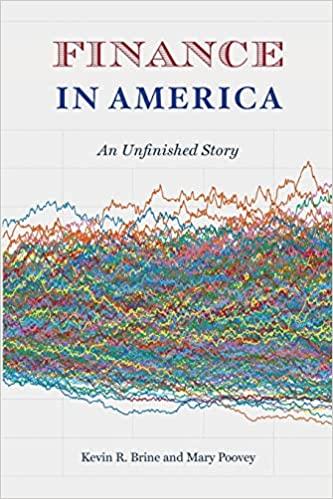Question
Indicate whether the sentence or statement is true or false. 1. The time value of money is the gain of purchasing power that occurs over
Indicate whether the sentence or statement is true or false.
1. The time value of money is the gain of purchasing power that occurs over time as a result of inflation.
2. In inflation, a dollar received now can purchase more than a dollar received five years from now.
3. Simple interest is added onto the principal to determine the total amount owed or due.
4. Compound interest is the interest that is earned or charged on both the principal amount and on the interest already accrued.
5. The present value of a future lump sum factor is 1 / ( 1 + i ) n .
6. An annuity is a stream of equal payments over a regular time interval.
7. In an annuity due, payments are made at the end of each period.
8. In an ordinary annuity due, payments are made at the end of each period.
9. The actual rate of return on an investment is the internal rate of return.
10. Capital budgeting is the method we use to justify the acquisition of those items that have a useful life in excess of one year.
11. If the present value of the benefits received outweigh the present value of the costs incurred, then a company should make the decision to invest in the project.
12. Future monies or benefits should be measured in after-tax dollars.
13. The first step involved in the capital budgeting decision is formulating the proposal.
14. Payback does not consider the time value of money.
15. The cost of capital to the borrower (owner) consists of the opportunity cost on the amount of equity invested in the business.
16. The weighted average cost of capital is the discount rate that is used in calculating the net present value for capital budgeting.
17. The profitability index is the ratio of the present value of the cost to the present value of the benefits.
18. A mutually exclusive investment is one where one investment is chosen and others are ultimately sacrificed or excluded.
19. Funds used to start a business are usually your own and borrowed financial capital.
20. As your individual business assets increase, the complexity of determining how to invest and protect these assets also increases.
21. Risk is a term based on the uncertainty of outcomes.
22. A holder of a U.S. Government bond has a greater uncertainty of getting back principal and interest than the holder of a corporate bond.
23. Speculative risk is uninsurable.
24. Pure risk involves only a chance of a loss.
25. A company that requires only cash in dealing with customers is following risk avoidance.
26. Insurance policies are examples of risk transfer.
27. A term life insurance policy has cash surrender value.
28. Municipal bonds are issued by government agencies other than the Federal government.
29. Preferred stock may be convertible.
30. Balanced funds invest in solid growth stocks only.
31. Trusts are legal arrangements that divide legal and beneficial interests among two or more people.
32. A draft (as used in international trade) is simply an order to pay money from one person (or company) to another.
33. The exporter is the party in the international transaction who initiates the events leading up to the issuance of bankers acceptances.
34. Individuals who invest by themselves in venture capital opportunities are called angel investors.
35. Generating returns for venture capital investors is often referred to as harvesting a return.
Step by Step Solution
There are 3 Steps involved in it
Step: 1

Get Instant Access to Expert-Tailored Solutions
See step-by-step solutions with expert insights and AI powered tools for academic success
Step: 2

Step: 3

Ace Your Homework with AI
Get the answers you need in no time with our AI-driven, step-by-step assistance
Get Started


